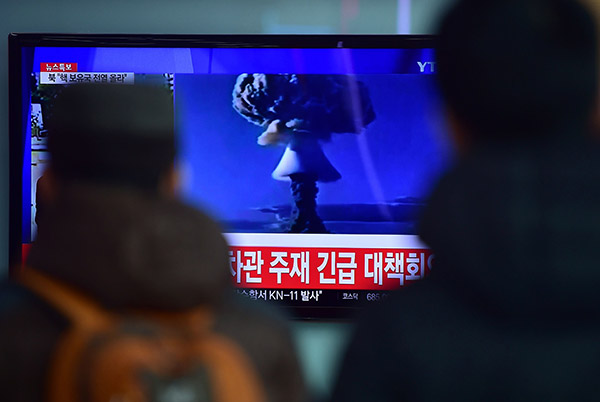ROK should say no to missile defense system
Updated: 2016-01-26 08:16
By Wang Junsheng(China Daily)
|
||||||||
 |
|
People at a railroad station in Seoul watch a news report on Wednesday after the Democratic People's Republic of Korea announced that it had conducted its first hydrogen bomb test. JUNG YEON-JE/AFP |
Republic of Korea President Park Geun-hye announced recently that her government will consider the deployment of the Terminal High Altitude Area Defense system, an advanced US anti-ballistic missile defense system, in the ROK.
Park's comment came after the Democratic People's Republic of Korea early this month carried out its fourth nuclear test since 2006, giving rise to speculation about the THAAD missile defense system's deployment, which has the potential to readjust the regional strategic structure and trigger an arms race in East Asia.
Unlike the ROK's previous ambiguous "Three Nos" policy - No Request, No Consultation, No Decision - Seoul's more favorable stance toward the US defense system is becoming clear, so too is Washington's strategic ambition.
The THAAD system, if deployed in the ROK, will obviously have a negative impact on regional security. Chinese Foreign Ministry spokesman Hong Lei has reiterated Beijing's stance that a country should consider other countries' safety and interests as well as the peace and stability of the whole region when seeking its own safety.
Strategically, the possible deployment of the THAAD system in the ROK would further worsen the peninsula situation, fueling the arms race between the ROK and the DPRK and leaving less room for China's neighborhood policy.
As Japan also showed interest in introducing the THAAD system last month, the ROK, and Japan could witness substantial progress in their military alliance with the US, which might even incubate a sort of "Asian NATO", if both Tokyo and Seoul decided to deploy the US system on their soil.
- Global health entering new era: WHO chief
- Brazil's planning minister steps aside after recordings revelation
- Vietnam, US adopt joint statement on advancing comprehensive partnership
- European border closures 'inhumane': UN refugee agency
- Japan's foreign minister calls A-bombings extremely regrettable
- Fukushima impact unprecedented for oceans: US expert

 Stars of Lijiang River: Elderly brothers with white beards
Stars of Lijiang River: Elderly brothers with white beards
 Wealthy Chinese children paying money to learn British manners
Wealthy Chinese children paying money to learn British manners
 Military-style wedding: Fighter jets, grooms in dashing uniforms
Military-style wedding: Fighter jets, grooms in dashing uniforms
 Striking photos around the world: May 16 - May 22
Striking photos around the world: May 16 - May 22
 Robots help elderly in nursing home in east China
Robots help elderly in nursing home in east China
 Hanging in the air: Chongqing holds rescue drill
Hanging in the air: Chongqing holds rescue drill
 2.1-ton tofu finishes in two hours in central China
2.1-ton tofu finishes in two hours in central China
 Six things you may not know about Grain Buds
Six things you may not know about Grain Buds
Most Viewed
Editor's Picks

|

|

|

|

|

|
Today's Top News
Liang avoids jail in shooting death
China's finance minister addresses ratings downgrade
Duke alumni visit Chinese Embassy
Marriott unlikely to top Anbang offer for Starwood: Observers
Chinese biopharma debuts on Nasdaq
What ends Jeb Bush's White House hopes
Investigation for Nicolas's campaign
Will US-ASEAN meeting be good for region?
US Weekly

|

|







